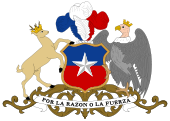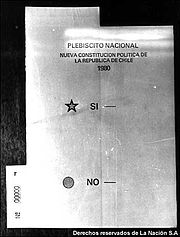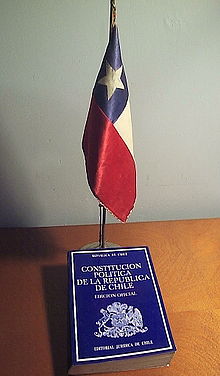- Chilean constitutional referendum, 1980
-
Chile 
This article is part of the series:
Politics and government of
Chile- Law
- President
- National Congress
- Ministries
- Political parties
- Elections
- Administrative divisions
- Foreign relations
The National Plebiscite in 1980 in Chile was a referendum held on September 11, 1980 to approve the 1980 Political Constitution of the Republic of Chile as a replacement for Chile's 1925 constitution. The result was 4,204,897 (67.04%) votes in favor and 1,893,420 (30.19%) votes against ratification. This plebiscite has been, and continues to be, questioned regarding irregularities in its management.[citation needed]
This election made way for the military regime of Augusto Pinochet, solidifying his position as President of the Republic (with increased powers) for 8 years, after which he would face a yes-or-no reelection plebiscite. Further reforms, beginning in 1989 and most recently in 2005, have attempted to make the constitution more democratic.
Contents
Plebiscite
In the election, Chileans older than 18 years of age (including the illiterate and blind) and foreigners with legal residence in Chile older than 18 years of age who could prove their proper immigration status, were allowed to vote. Participation was obligatory, except for those who were physically or mentally impaired, or imprisoned.
To vote, the only document required was a certificate of identity issued by the Civil and Identification Registry Service.
Results
The results supplied by the Colegio Escrutador Nacional (National Election Observer Association) were as follows.
Option Votes % [1] "Yes" votes 4,121,067 65.71% Blank votes 83,812 1.33% "Yes" total [2] 4,204,879 67.04% "No" votes 1,893,420 30.19% Invalid votes 173,569 2.77% Total votes cast 6,271,869 100% New constitution
In its original permanent dispositions, the new 1980 constitution gave the position of President of the Republic, held by Pinochet, a large amount of power. It created some new institutions, such as the Constitutional Tribunal and the controversial National Security Council (COSENA). In its temporary dispositions, the document ordered the transition from the former military government, with Augusto Pinochet as President of the Republic, and the Legislative Power of the Military Junta (formed by the heads of the Navy, Air Force, National Police, and a representative of the Army, the head of the Army being president of the republic), to a civil one, with a time frame of eight years, during which the Legislative Power would still be the Military Junta. It set the first eight year presidential term for Pinochet, with a plebiscite in the eighth year, in which only one candidate, nominated by the Junta, would be up for acceptance.
The candidate, as expected, was Pinochet himself. While the steps to follow in the case of a triumph of the "yes" option, which the document clearly anticipated, were clearly delineated, the steps for the "no" triumph were less so, but still clear enough that no serious doubt emerged when the "no" option actually was victorious in the 1988 plebiscite.
Some of the 1980 constitution's original dispositions, such as the presidential power of dissolving the Lower Chamber of Congress and serving eight year terms with possibility of reelection, were modified or eliminated after 1990, when the country regained its democracy and the Congress was reestablished.
Consequences
The results of the plebiscite approved the Constitution of 1980. However, the given results were objected to by the political opposition, headed by the ex-senator Patricio Aylwin and more than 46 others, arguing that this result did not tally with electoral records. One objection was that voters were only marked by ink on the thumb, which came off rapidly, making electoral fraud easy. These criticisms were rejected by the Scrutiny Association, and the Constitution was promulgated on October 21, 1980.
The new constitution took effect on March 11, 1981. On this date a transition period of eight years began, during which General Pinochet, acting as President of the Republic and the Military Regime (Junta), exercised constituent and legislative power.
References
- Nazer A., Ricardo y Rosemblit B., Jaime (2000). Electores, sufragio y democracia en Chile: una mirada histórica. Revista de Humanidades y Ciencias Sociales. http://www.memoriachilena.cl/temas/documento_detalle.asp?id=MC0018630.
- Silva Bascuñán, Alejandro (1997). Tratado de Derecho Constitucional. Tomo III: La Constitución de 1980. Antecedentes y génesis.. Santiago de Chile: Ed. Jurídica de Chile. ISBN 956-10-1178-6.
- Decree 3465 of August 8, 1980, Interior Ministry of Chile.
- Brief review of Chile's constitutional history - Chile's Library of Congress (in Spanish)
External links
- Official translation of the original 1980 Constitution (PDF file)
- Text of Chilean constitutions - Library of Congress of Chile (Spanish original)
 Elections and referendums in Chile
Elections and referendums in ChilePresidential elections Parliamentary elections 1811 · 1818 · 1823 · 1824 · 1825 · 1827 · 1829 · 1831 · 1834 · 1837 · 1840 · 1843 · 1846 · 1849 · 1852 · 1855 · 1858 · 1861 · 1864 · 1867 · 1870 · 1873 · 1876 · 1879 · 1882 · 1885 · 1888 · 1891 · 1894 · 1897 · 1900 · 1903 · 1906 · 1909 · 1912 · 1915 · 1918 · 1921 · 1924 · 1925 · 1930 · 1932 · 1937 · 1941 · 1945 · 1949 · 1953 · 1957 · 1961 · 1965 · 1969 · 1973 · 1989 · 1993 · 1997 · 2001 · 2005 · 2009Municipal elections 1935 · 1938 · 1941 · 1944 · 1947 · 1950 · 1953 · 1956 · 1959 · 1963 · 1967 · 1971 · 1992 · 1996 · 2000 · 2004 · 2008Referendums See also: Elections in PichilemuCategories:- 1980 referendums
- Referendums in Chile
- Chilean law
- 1980 in Chile
- 1980 elections in South America
Wikimedia Foundation. 2010.


